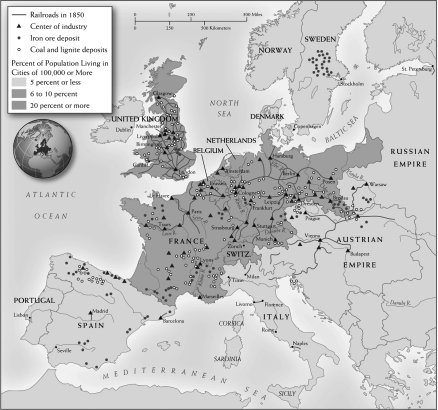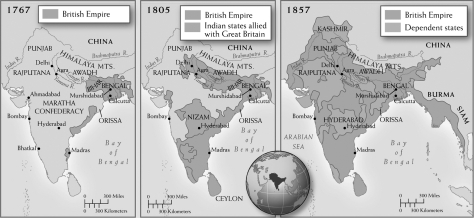Exam 8: Reordering the World 1750-1850
Exam 1: The Rise of Universalizing Religions 300-600 Ce52 Questions
Exam 2: New Empires and Common Cultures 600-1000 Ce69 Questions
Exam 3: Becoming the World 1000-1300 Ce75 Questions
Exam 4: Crisis and Recovery in Afro-Eurasia 1300-150089 Questions
Exam 5: Contact, Commerce, and Colonization 1450-160074 Questions
Exam 6: Worlds Entangled 1600-175086 Questions
Exam 7: Cultures of Splendor and Power 1500-1780104 Questions
Exam 8: Reordering the World 1750-185080 Questions
Exam 9: Alternative Visions of the Nineteenth Century86 Questions
Exam 10: Nations and Empires 1850-191487 Questions
Exam 11: An Unsettled World 1890-1914108 Questions
Exam 12: Of Masses and Visions of the Modern 1910-193986 Questions
Exam 13: The Three-World Order 1940-197589 Questions
Exam 14: Globalization 1970-200083 Questions
Select questions type
What effect did the end of the Atlantic slave trade have in Africa?
(Multiple Choice)
4.9/5  (21)
(21)
The first anti-colonial uprisings in Spanish America were motivated by the example of the French Revolution.
(True/False)
4.8/5  (32)
(32)
How did the migration of Qing peasants differ from the migration of workers in Britain?
(Multiple Choice)
4.8/5  (34)
(34)
In early-nineteenth-century industrial societies, why did migration to urban areas increase so rapidly?
(Multiple Choice)
4.9/5  (40)
(40)
Questions refer to the map below.
Industrial Europe around 1850  -What historical development would account for the large numbers of railroads and populated cities being in the United Kingdom?
-What historical development would account for the large numbers of railroads and populated cities being in the United Kingdom?
(Multiple Choice)
4.9/5  (40)
(40)
Use the maps below to answer all part of the question that follows.
The British in India, 1767-1857  (A) Describe ONE change represented in the three maps of India regarding the British.
(B) Identify ONE reason for the change in Part A.
(C) Explain ONE historical development that would account for the changes in the maps regarding the British in India.
(A) Describe ONE change represented in the three maps of India regarding the British.
(B) Identify ONE reason for the change in Part A.
(C) Explain ONE historical development that would account for the changes in the maps regarding the British in India.
(Essay)
5.0/5  (29)
(29)
Which of the following accurately describes the political revolution against the Spanish monarchy in early nineteenth-century Latin America?
(Multiple Choice)
4.8/5  (42)
(42)
During the eighteenth and nineteenth centuries, how did India's traditional trade patterns change?
(Multiple Choice)
4.9/5  (26)
(26)
The American Revolution was the first of a series of revolutions to shake the Atlantic world, inspired by new ideas of freedom.
(True/False)
4.8/5  (32)
(32)
Jean-Léon Gérôme's Bashi-Bazouk (1868-69) is considered an Orientalist portrait because the artist staged the depiction of an Ottoman solider in a European studio.
(True/False)
4.8/5  (39)
(39)
The development of industrial capitalism led to increased standards of living for some, and to continued improvement in manufacturing methods that increased the availability, affordability, and variety of consumer goods.
Develop an argument that evaluates the extent to which the Industrial Revolution transformed societies around the world.
In your response you should do the following:
Respond to the prompt with a historically defensible thesis or claim that establishes a line of reasoning.
Describe a broader historical context relevant to the prompt.
Support an argument in response to the prompt using specific and relevant examples of evidence.
Use historical reasoning (e.g., comparison, causation, continuity or change) to frame or structure an argument that addresses the prompt.
Use evidence to corroborate, qualify, or modify an argument that addresses the prompt.
(Essay)
4.8/5  (28)
(28)
Why did King Pedro separate Brazil from Portuguese rule and declare Brazil to be a constitutional monarchy?
(Multiple Choice)
4.7/5  (46)
(46)
In the Ottoman Empire, why did reform attempts, such as the Tanzimat, ultimately fail to produce revolutionary change?
(Multiple Choice)
4.8/5  (37)
(37)
Who constituted "the people," according to political arrangements Americans made during the War of Independence?
(Multiple Choice)
4.9/5  (30)
(30)
Where did participation in global trade first begin to have a significant impact on the lives of ordinary people?
(Multiple Choice)
4.8/5  (39)
(39)
Questions refer to the passage below.
Kingston, Jamaica, September 6, 1815
. . . the destiny of America has been irrevocably decided; the tie that bound her to Spain has been severed. Only a concept maintained that tie and kept the parts of that immense monarchy together. That which formerly bound them now divides them. The hatred that the Peninsula has inspired in us is greater than the ocean between us. It would be easier to have the two continents meet than to reconcile the spirits of the two countries. The habit of obedience; a community of interest, of understanding, of religion; mutual goodwill; a tender regard for the birthplace and good name of our forefathers; in short, all that gave rise to our hopes, came to us from Spain. As a result, there was born principle of affinity that seemed eternal, notwithstanding the misbehavior of our rulers which weakened that sympathy, or, rather, that bond enforced by the domination of their rule. At present the contrary attitude persists: we are threatened with the fear of death, dishonor, and every harm; there is nothing we have not suffered at the hands of that unnatural stepmother-Spain. The veil has been torn asunder. We have already seen the light, and it is not our desire to be thrust back into darkness. . . .
The role of the inhabitants of the American hemisphere has for centuries been purely passive. Politically they were nonexistent. We are still in a position lower than slavery, and therefore it is more difficult for us to rise to the enjoyment of freedom. . . . States are slaves because of either the nature or the misuse of their constitutions; a people is therefore enslaved when the government, by its nature or its vices, infringes on and usurps the rights of the citizen or subject.
Simon Bolivar, "Letter from Jamaica," 1815
-Which of the following statements best expresses the purpose of Bolivar's letter?
(Multiple Choice)
4.8/5  (26)
(26)
Questions refer to the passage below.
Olympe de Gouges (1748-1793) was an early supporter of the French Revolution. The 1791 constitution extended male suffrage, but that right was not granted to women. De Gouges responded in the following passage:
"Women, wake up; the tocsin of reason is being heard throughout the whole universe; discover your rights. The powerful empire of nature is no longer surrounded by prejudice, fanaticism, superstition, and lies . . . Oh, women, women! When will you cease to be blind? What advantage have you received from the Revolution? A more pronounced scorn, a more marked disdain . . . Regardless of what barriers confront you, it is in your power to free yourselves; you have only to want to. . . .
I offer a foolproof way to elevate the soul of women; it is to join them in all activities of man; if man persists in finding this way impractical, let him share his fortune with woman, not at his caprice, but by the wisdom of laws. Prejudice falls, morals are purified, and nature regains all her rights."
Declaration of the Rights of Woman and the Female Citizen (1791), Olympe de Gouges
-De Gouges's ideology would be MOST similar to which of the following authors?
(Multiple Choice)
4.8/5  (42)
(42)
Questions refer to the passage below.
Kingston, Jamaica, September 6, 1815
. . . the destiny of America has been irrevocably decided; the tie that bound her to Spain has been severed. Only a concept maintained that tie and kept the parts of that immense monarchy together. That which formerly bound them now divides them. The hatred that the Peninsula has inspired in us is greater than the ocean between us. It would be easier to have the two continents meet than to reconcile the spirits of the two countries. The habit of obedience; a community of interest, of understanding, of religion; mutual goodwill; a tender regard for the birthplace and good name of our forefathers; in short, all that gave rise to our hopes, came to us from Spain. As a result, there was born principle of affinity that seemed eternal, notwithstanding the misbehavior of our rulers which weakened that sympathy, or, rather, that bond enforced by the domination of their rule. At present the contrary attitude persists: we are threatened with the fear of death, dishonor, and every harm; there is nothing we have not suffered at the hands of that unnatural stepmother-Spain. The veil has been torn asunder. We have already seen the light, and it is not our desire to be thrust back into darkness. . . .
The role of the inhabitants of the American hemisphere has for centuries been purely passive. Politically they were nonexistent. We are still in a position lower than slavery, and therefore it is more difficult for us to rise to the enjoyment of freedom. . . . States are slaves because of either the nature or the misuse of their constitutions; a people is therefore enslaved when the government, by its nature or its vices, infringes on and usurps the rights of the citizen or subject.
Simon Bolivar, "Letter from Jamaica," 1815
-Which of the following served as an inspiration to Bolivar?
(Multiple Choice)
4.8/5  (28)
(28)
What invention transformed sugar refining, pottery making, and textile making?
(Multiple Choice)
4.8/5  (44)
(44)
Which of the following was a consequence of Napoleon's failed attempt to create a French continental empire?
(Multiple Choice)
4.9/5  (35)
(35)
Showing 41 - 60 of 80
Filters
- Essay(0)
- Multiple Choice(0)
- Short Answer(0)
- True False(0)
- Matching(0)